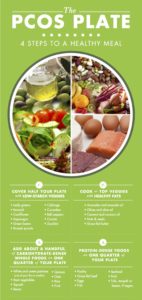If you’re living with PCOS, you’re no stranger to fatigue. That persistent, bone-deep tiredness that doesn’t go away with a good night’s sleep. This kind of exhaustion makes fighting PCOS doubly difficult because you feel too wiped out to go to the gym, make doctors’ appointments, and change your eating habits. I struggled with PCOS fatigue for years. You are not lazy, and you are not imagining it!
Chronic fatigue is one of the most common and frustrating symptoms of polycystic ovary syndrome (PCOS). It’s not just about feeling tired; it’s about feeling drained, overwhelmed, and disconnected from your own body. But here’s the good news: you don’t have to just “push through it.” With the right strategies, you can reclaim your energy and start feeling like yourself again.
Understanding PCOS Fatigue: Why It’s Not Just in Your Head
PCOS isn’t just a reproductive condition; it’s a metabolic and hormonal imbalance that affects your entire body. One of the key contributors to fatigue is chronic low-grade inflammation. Studies have shown that women with PCOS often have elevated levels of C-reactive protein (CRP), a marker of inflammation, even in the absence of obesity. This inflammation can interfere with insulin sensitivity, disrupt sleep, and drain your energy. (Source)
Additionally, PCOS is associated with mitochondrial dysfunction, which affects how your cells produce energy. This means your body may not be efficiently converting food into fuel, leaving you feeling sluggish and fatigued .
The Hormonal Rollercoaster: How Hormones Affect Your Energy
Hormones play a significant role in regulating your energy levels. In PCOS, hormonal imbalances—such as elevated androgens (like testosterone) and insulin resistance—can contribute to fatigue. These imbalances can disrupt your sleep patterns, increase stress levels, and make it harder for your body to recover from daily activities.
Moreover, chronic stress can exacerbate these hormonal imbalances, creating a vicious cycle that perpetuates fatigue. High levels of cortisol, the body’s primary stress hormone, can interfere with sleep and increase feelings of tiredness. (Source)
Practical Strategies to Combat PCOS Fatigue
Now that we’ve explored the underlying causes of PCOS-related fatigue, let’s discuss actionable steps you can take to boost your energy levels. You can download my free PCOS fatigue-fighting checklist here.
1. Prioritize Sleep Hygiene
Quality sleep is essential for restoring energy levels. Establish a consistent sleep schedule, create a calming bedtime routine, and ensure your sleep environment is conducive to rest. Limiting screen time before bed and managing stress through relaxation techniques can also improve sleep quality.
2. Incorporate Anti-Inflammatory Foods
A diet rich in anti-inflammatory foods can help reduce chronic inflammation associated with PCOS. Focus on whole foods like leafy greens, berries, fatty fish, nuts, and seeds. These foods are high in antioxidants and omega-3 fatty acids, which can help lower inflammation and support overall health.
3. Stay Hydrated
Dehydration can exacerbate feelings of fatigue. Aim to drink plenty of water throughout the day. Herbal teas, such as ginger or peppermint, can also be hydrating and provide additional health benefits.
4. Manage Stress Effectively
Chronic stress can drain your energy and worsen PCOS symptoms. Engage in stress-reducing activities like yoga, meditation, deep breathing exercises, or journaling. Regular physical activity can also help reduce stress levels and improve mood.
5. Consider Supplementation
Certain supplements may support energy levels in women with PCOS. Inositol, particularly in the form of myo-inositol and D-chiro-inositol, has been shown to improve insulin sensitivity and ovarian function. Alpha-lipoic acid (ALA) is another supplement that may help reduce inflammation and improve insulin sensitivity. However, it’s important to consult with a healthcare provider before starting any new supplement regimen.
6. Engage in Regular Physical Activity
While it may seem counterintuitive, regular exercise can actually boost energy levels. Physical activity increases the production of endorphins, which are natural mood lifters. Aim for a mix of aerobic exercises, strength training, and flexibility exercises to support overall health and energy.
7. Seek Support and Community
Living with PCOS can be challenging, but you don’t have to do it alone. Connecting with others who understand your experiences can provide emotional support and practical advice. Consider joining support groups, either in person or online, where you can share experiences and learn from others.
Bonus Energy Boosters You Might Be Missing
8. Correct B12 Deficiencies
Many women with PCOS are at a higher risk for vitamin B12 deficiency, especially if they are taking metformin, which is commonly prescribed to manage insulin resistance. Low B12 levels can lead to fatigue, brain fog, and low mood. Supplementing with B12—particularly in its methylated form—may help restore energy and support nervous system health. If you’re feeling unusually tired, it’s worth asking your healthcare provider to check your levels. (Source)
9. Get Screened for Thyroid Disorders
PCOS and thyroid dysfunction often go hand in hand. Hypothyroidism—where the thyroid is underactive—can cause fatigue, weight gain, depression, and cold intolerance. Many symptoms of thyroid imbalance overlap with PCOS, making it easy to overlook. Routine thyroid testing, including TSH, Free T3, Free T4, and thyroid antibodies, can help identify if this is contributing to your energy struggles. (Source)
10. Correct Sleep Apnea if You Have It
Sleep apnea—a condition where breathing repeatedly stops and starts during sleep—is more common in women with PCOS than in the general population. It’s a major, often underdiagnosed contributor to chronic fatigue. If you snore, wake up frequently during the night, or still feel exhausted after a full night’s rest, it might be time to get evaluated. Treating sleep apnea can lead to significant improvements in energy, focus, and quality of life. (Source)
11. Eat a PCOS Plate to Keep Energy Levels Steady

Blood sugar swings are a major contributor to PCOS fatigue. To maintain steady energy throughout the day, aim to build your meals using a hormone-friendly template, like the “PCOS Plate.” This includes plenty of non-starchy vegetables, a moderate portion of lean protein, healthy fats, and complex carbohydrates with fiber. This balanced approach supports blood sugar stability, reduces insulin spikes, and helps prevent the crashes that leave you tired and moody. View the PCOS Plate infographic here
Looking Ahead: Empowering Your Journey
Fighting PCOS fatigue is not about pushing through exhaustion; it’s about understanding your body and making informed choices that support your health. By addressing the root causes of fatigue and implementing sustainable strategies, you can regain your energy and improve your quality of life.
If you’re tired of feeling tired—and ready for real, sustainable tools that support your energy, your hormones, and your peace of mind— download my free guide to fighting PCOS Fatigue.





